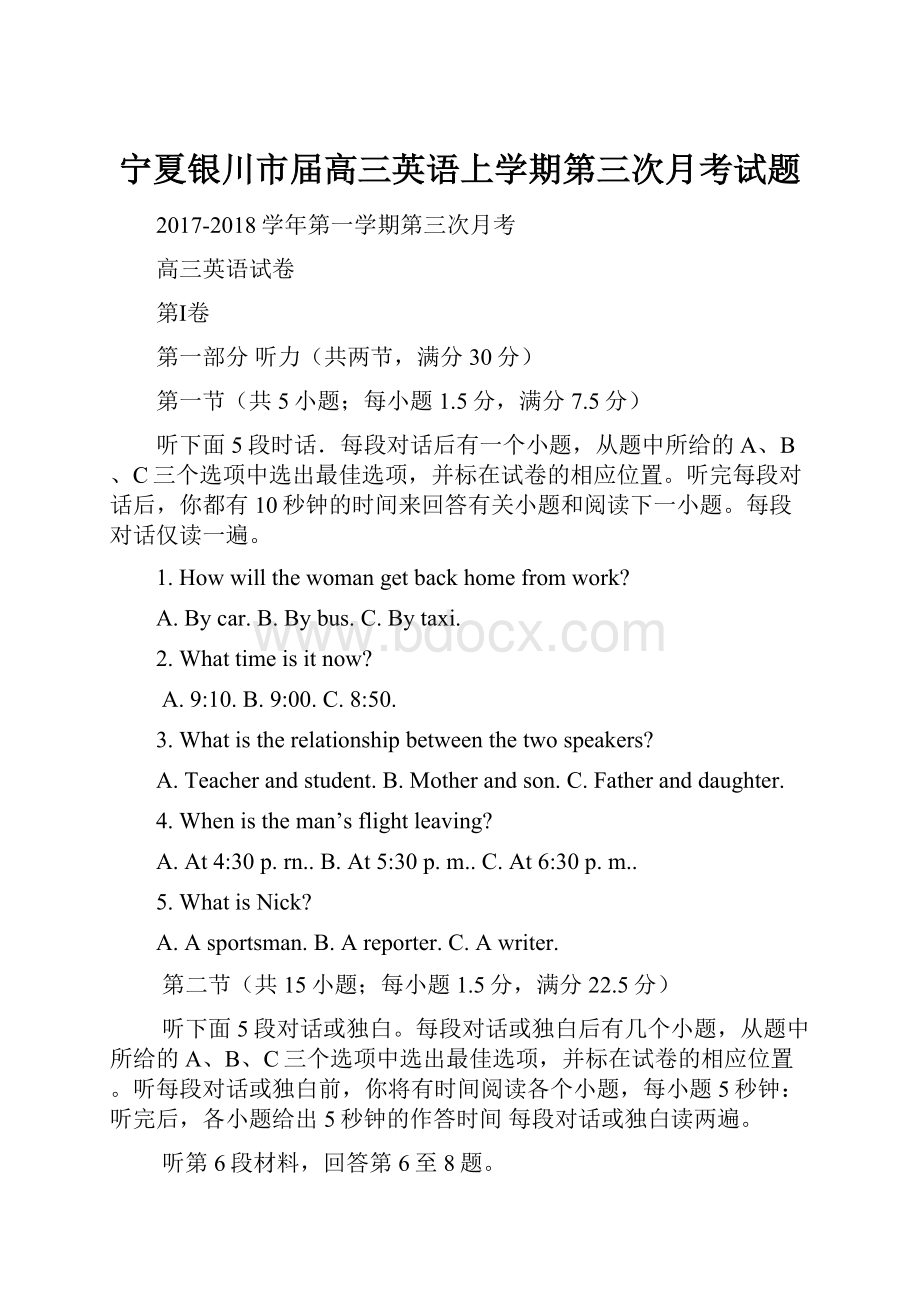宁夏银川市届高三英语上学期第三次月考试题.docx
《宁夏银川市届高三英语上学期第三次月考试题.docx》由会员分享,可在线阅读,更多相关《宁夏银川市届高三英语上学期第三次月考试题.docx(15页珍藏版)》请在冰豆网上搜索。

宁夏银川市届高三英语上学期第三次月考试题
2017-2018学年第一学期第三次月考
高三英语试卷
第Ⅰ卷
第一部分听力(共两节,满分30分)
第一节(共5小题;每小题1.5分,满分7.5分)
听下面5段时话.每段对话后有一个小题,从题中所给的A、B、C三个选项中选出最佳选项,并标在试卷的相应位置。
听完每段对话后,你都有10秒钟的时间来回答有关小题和阅读下一小题。
每段对话仅读一遍。
1.Howwillthewomangetbackhomefromwork?
A.Bycar.B.Bybus.C.Bytaxi.
2.Whattimeisitnow?
A.9:
10.B.9:
00.C.8:
50.
3.Whatistherelationshipbetweenthetwospeakers?
A.Teacherandstudent.B.Motherandson.C.Fatheranddaughter.
4.Whenistheman’sflightleaving?
A.At4:
30p.rn..B.At5:
30p.m..C.At6:
30p.m..
5.WhatisNick?
A.Asportsman.B.Areporter.C.Awriter.
第二节(共15小题;每小题1.5分,满分22.5分)
听下面5段对话或独白。
每段对话或独白后有几个小题,从题中所给的A、B、C三个选项中选出最佳选项,并标在试卷的相应位置。
听每段对话或独白前,你将有时间阅读各个小题,每小题5秒钟:
听完后,各小题给出5秒钟的作答时间每段对话或独白读两遍。
听第6段材料,回答第6至8题。
6.Whendidtheconversationtakeplace?
A.Atabout9:
30.B.Atabout9:
00.C.Atabout10:
00.
7.Whatcanweknowaboutthemanspeaker?
A.Hewashealthy.B.Hewasveryill.C.Hewasworried.
8.WhydidMr.Lewiscometohospital?
A.Hehadtolookafterhiswife.B.Hehadtocometoseethedoctor.
C.Hehadtopaythedoctormoney.
听第7段材料,回答第9至11题。
9.Howsoonwilltheygooutforapicnic?
A.Inhalfanhour.B.Inanhourandahalf.C.Inanhour.
10.Howmanypeoplewillprobablygotogether?
A.Two.B.Three.C.Four.
11.Howwilltheygotohaveapicnic?
A.Bycar.B.Bybus.C.Onfoot.
听第8段材料,回答第12至14题。
12.Whatarethespeakerstalkingabout?
A.Learningtodrive.B.Goingshopping.C.Goingforapicnic.
13.Whenwillthespeakersgo?
A.ThisSunday.B.NextSaturday.C.NextSunday.
14.Whatwillthewomanmostprobablydothedaybeforetheygo?
A.Preparethecar.B.Buysomefood.C.Writeareport.
听第9段材料,回答第15至17题。
15.Wheredoestheconversationprobablytakeplace?
A.Inabedroom.B.Inacar.C.Onatrain.
16.Whatdoesthewomanwantthemantodo?
A.Wakeup.B.Stopthecar.C.Driveslower.
17.Whatdoesthemanthinkmainlyleadstotheaccident?
A.Talkingonthecar.B.Drinkingtoomuch.C.Drivinginahurry.
听第10段材料,回答第l8至20题。
18.Whatmadethespeakerwanttobeadoctor?
A.Hismother’sdeath.B.Fewerdoctorsthere.C.Adoctor’sgoodpay.
19.Wheredoesthespeakerstudynow?
A.Inamedicalschool.B.Inamedicalcollege.C.Inahighschool.
20.Whatcanwelearnaboutthespeaker?
A.Hethinksbeingadoctorisn’tdifficult.
B.Hehastakenallthemedicalclassesinhighschool.
C.HelikesthegameOPERATIONnow.
第二部分阅读理解(共两节,满分40分)
第一节(共15小题;每小题2分,满分30分)
阅读下列短文,从每题所给的四个选项(A、B、C和D)中,选出最佳选项,并在答题卡上将该项涂黑。
A
ThanksgivingDayisaspecialholidayintheUnitedStatesandCanada.Familiesandfriendsgathertoeatandgivethanksfortheirblessing.
ThanksgivingDayisreallyaharvestfestival.Thisiswhyitiscelebratedinlatefall,afterthecropsarein.ButoneofthefirstthanksgivingsinAmericahadnothingtodowithagoodharvest.OnDecember4,1619,thePilgrimsfromEnglandlandednearwhatisnowCharlesCity,Virginia.TheykneltdownandthankedGodfortheirsafejourneyacrosstheAtlantic.
ThefirstNewEnglandThanksgivingdidcelebratearichharvest.ThePilgrimslandedatwhatisnowPlymouth,Massachusetts,in1620.Theyhadadifficulttimeandthefirstwinterwascruel.ManyofthePilgrimsdied.Butthenextyear,theyhadagoodharvest.SoGovernorBradforddeclaredathree-dayfeast.ThePilgrimsinvitedIndianfriendstojointhemfortheirspecialfeast.Everyonebroughtfood.
Intime,othercolonies(殖民地)begantocelebrateadayofthanksgiving.ButittookyearsbeforetherewasanationalThanksgivingDay.DuringtheCivilWar,SarahJosephaHalepersuadedAbrahamLincolntodosomthingaboutit.HeclaimedthelastThursdayofNovember1863asadayofthanksgiving.Today,AmericanscelebratethishappyharvestfestivalonthefourthThursdayinNovember.CanadianscelebrateThanksgivingDayinmuchthesamewayastheirAmericanneighbours.ButtheCanadianThanksgivingDayfallsonthesecondMondayinOctober.
21.ThanksgivingDayiscelebrated_________
A.inspringB.insummerC.inautumnD.inwinter
22.ThefirsttocelebrateThanksgivingwere____.
A.peopleinCanadaB.GovernorBradford
C.somepeoplefromEnglandD.theAmericanIndians.
23.WecaninferfromthepassagethatNewEnglandmustbe____.
A.intheUSB.inGreatBritainC.inCanadaD.onsomeislandofftheAtlantic
24.Thepassagemainlytellsus_____.
A.howThanksgivingDaycameintobeingandthedifferentwaysitiscelebrated
B.howtocelebrateThanksgivingDay
C.thatThanksgivingDaychangedwiththetimeandplaces
D.WhyThanksgivingDayisaharvestholiday
B
A Guide to the University
Food
The TWU Cafeteria is open 7 a.m. to 8 p.m. It serves snacks(小吃), drinks, ice cream bars and
meals. You can pay with cash or your ID cards. You can add meal money to your ID cards at the Front Desk. Even if you do not buy your food in the cafeteria, you can use the tables to eat your lunch, to
have meetings and to study.
If you are on campus in the evening or late at night, you can buy snacks, fast food, and drinks in
the Lower Café located in the bottom level of the Douglas Centre. This area is often used for
entertainment such as concerts, games or TV watching.
Relaxation
The Globe, located in the bottom level of McMillan Hall, is available for relaxing, studying,
cooking, and eating. Monthly activities are held here for all international students. Hours are 10 a.m. to 10 p.m., closed on Sundays.
Health
Located on the top floor of Douglas Hall, the Wellness Centre is committed to physical, emotional and social health. A doctor and nurse is available if you have health questions or need immediate
medical help or personal advice. The cost of this is included in your medical insurance. Hours are
Monday to Friday, 9 a.m. to noon and 1:
00 to 4:
30 p.m.
Academic Support
All students have access to the Writing Centre on the upper floor of Douglas Hall. Here, qualified volunteers will work with you on written work, grammar, vocabulary, and other academic skills. You
can sign up for an appointment on the sign-up sheet outside the door:
two 30-minute appointments per week maximum. This service is free.
25. What can you do in the TWU Cafeteria?
A. Do homework and watch TV. B. Buy drinks and enjoy concerts.
C. Have meals and meet with friends. D. Add money to your ID and play chess.
26. Where and when can you cook your own food?
A. The Globe, Friday. B. The Lower Café, Sunday.
C. The TWU Cafeteria, Friday. D. The McMillan Hall, Sunday.
27. The Guide tells us that the Wellness Centre.
A. is open six days a week B. offers services free of charge
C. trains students in medical care D. gives advice on mental health
28. How can you seek help from the Writing Centre?
A. By applying online. B. By calling the centre.
C. By filling in a sign-up form. D. By going to the centre directly.
C
AsmoreandmorepeoplespeakthegloballanguagesofEnglish,Chinese,Spanish,andArabic,otherlanguagesarerapidlydisappearing.Infact,halfofthe6,000-7,000languagesspokenaroundtheworldtodaywilllikelydieoutbythenextcentury,accordingtotheUnitedNationsEducational,Scientific,andCulturalOrganization(UNESCO).
Inanefforttopreventlanguageloss,scholarsfromanumberoforganizations-UNESCOandNationalGeographicamongthem–haveformanyyearsbeendocumentingdyinglanguagesandtheculturestheyreflect.
MarkTurin,ascientistattheMacmillanCenter,YaleUniversity,whospecializesinthelanguagesandoraltraditionsoftheHimalayas,isfollowing inthattradition.Hisrecentlypublishedbook,AGrammarofThangmiwithanEthnolinguisticIntroductiontotheSpeakersandTheirCulture,growsoutofhisexperienceliving,lookingandraisingafamilyinavillageinNepal.DocumentingtheTangmilanguageandcultureisjustastartingpointforTurin,whoseekstoincludeotherlanguagesandoraltraditionsacrosstheHimalayansreachesofIndia,Nepal,Bhutan,andChina.Butheisnotcontenttosimplyrecordthesevoicesbeforetheydisappearwithoutrecord.
AttheUniversityofCambridgeTurindiscoveredawealthofimportantmaterials-includingphotographs,films,taprecordings,andfieldnotes-whichhadremainedunstudiedandwerebadlyinneedofcareandprotection.
Now,throughthetwoorganizationsthathehasfounded-theDigitalHimalayaProjectandtheWorldOralLiteratureProject-Turinhasstartedacampaigntomakesuchdocuments,foundinlibrariesandstoresaroundtheworld,availablenotjusttoscholarsbuttotheyoungers.Generationsofcommunitiesfromwhomthematerialswereoriginallycollected.ThankstodigitaltechnologyandthewidelyavailableInternet.Turinnotes,theendangeredlanguagescanbesavedandreconnectedwithspeechcommunities.
29.Manyscholarsaremakingeffortsto_____.
A.promotegloballanguagesB.rescuethedisappearinglanguages
C.searchforlanguagecommunitiesD.setuplanguagesresearchorganizations.
30.Whatdoes“thattradition”inParagraph3referto?
A.HavingfirstrecordsofthelanguagesB.Writingbooksonlanguagesearching
C.TellingstoriesaboutlanguageusersD.Linkingwiththenativespeakers
31.WhatisTurin’sbookbasedon?
A.TheculturalstaticsinIndia.B.ThedocumentsavailableatYale.
C.HislanguageresearchinBritain.D.HispersonalexperienceinNepal.
32.WhichofthefollowingbestdescribeTurin’s Work?
A.Writesellanddonate.B.Record,repeatandreward.
C.Collect,protectandreconnect.D.Design,experimentandreport.
D
Douglas Grace talks about his ideal city of the future. I see the city of the future in three zones(区